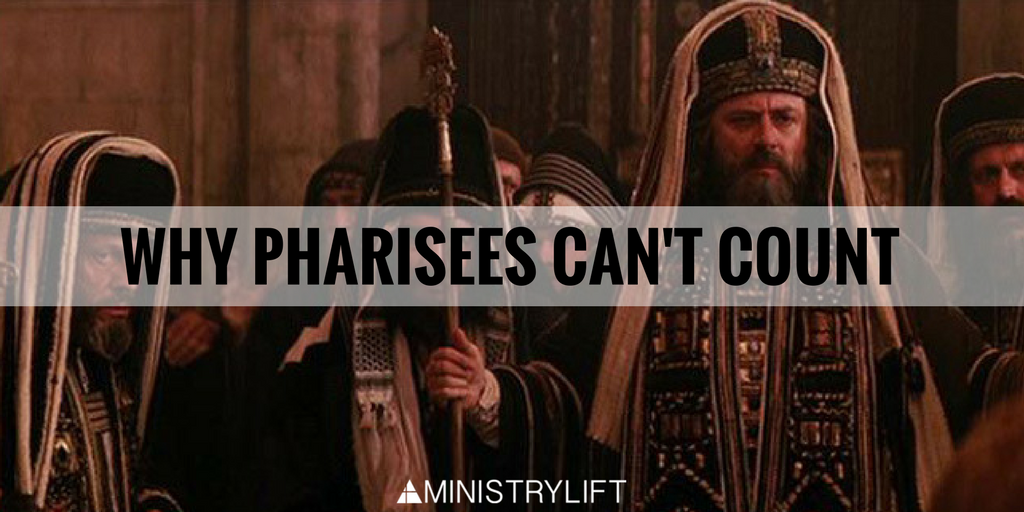Why Pharisees Can't Count
 "Joe had curly hair. But he didn’t know how much hair he had because he couldn’t count that high. In fact, he couldn’t count at all." [1]
"Joe had curly hair. But he didn’t know how much hair he had because he couldn’t count that high. In fact, he couldn’t count at all." [1]
Joe is a fictional character in an imaginative children’s book called Sideways Stories from Wayside School. In the third chapter, we learn that Joe isn’t allowed to go to recess because he can’t count correctly. When his teacher, Mrs. Jewls, asks him to count five pencils, Joe says, "Four, six, one, nine, five. There are five pencils, Mrs. Jewls." Even though his answer is correct, Mrs. Jewls tells Joe that he is wrong: "You got the right answer, but you counted the wrong way."
Joe’s counting problem is an example of why the process in which we do things is important. His teacher understood that his answer was lucky—even a broken clock is right two times a day—so the way he counted had to change. His method wasn’t sufficient or sustainable.
I’m sometimes tempted to believe that arriving at the right answer validates the way that I got there. But when we place too much weight on the "right" thing, we can discount the process which is often as important as the result. When I’m truthful with myself, I discover that some of my honourable deeds are prompted by a heart that is less-than-honourable. An act of generosity is sparked by my hope that I’ll be recognized; a gesture of service is motivated by my desire to please someone; a decision to sacrifice my agenda is fueled by the possibility that I will get my way the next time.
When my noble actions are prompted by selfish motives, I live like a Pharisee. I might arrive at the "right" answer, but I’m counting the wrong way.
Timothy Keller suggests the main barrier between Pharisees and God is not their sins, but their damnable good works [2]. He explains this further by stating:
To truly become Christians we must also repent of the reasons we ever did anything right. Pharisees only repent of their sins, but Christians repent of the very root of their righteousness, too. We must learn how to repent of the sin under all our other sins and under all our righteousness—the sin of seeking to be our own Saviour and Lord.
The call to repent is at the foundation of what it means to be a disciple of Jesus. When we refuse to acknowledge our wrongdoings—even if they lead to acts of righteousness—we cease to be disciples and start counting like Pharisees.
The reason why Pharisees can’t count is because they focus on righteous deeds instead of developing righteous hearts. This emphasis blinded them to their sinful motives. For example, when they declared that Jesus had broken the Sabbath, they did not consider the irony of using the same day to plot how they might kill Him (Matthew 12:9-14).
Let’s return to the story of Joe’s trouble with counting. Despite the efforts of his teacher, Joe feels confused and frustrated. "This doesn’t make sense," said Joe. "When I count the wrong way I get the right answer, and when I count right I get the wrong answer." I’m fascinated by how close these words sound to what Jesus says in John 9:39: "For judgment I have come into this world, so that the blind will see and those who see will become blind."
Sometimes, the things we need to repent of most are the very things we cannot see. This might be one reason why we’re told to confess our sins to each other (James 5:16).
Joe finds an easy solution. He wakes up the next day and can count. He discovers he has 55,006 hairs on his head.
Repenting of our sins and confessing them to each other isn’t nearly as easy as waking up one morning. But if we choose not to do it, we choose to count blindly.
Keith Reed is the Associate Director of MinistryLift at MB Seminary.
1. Louis Sachar, Sideways Stories from Wayside School (New York: Avon Books), 1978.
2. Timothy Keller, The Prodigal God: Recovering the Heart of the Christian Faith (New York: Riverhead Books), 2008.
